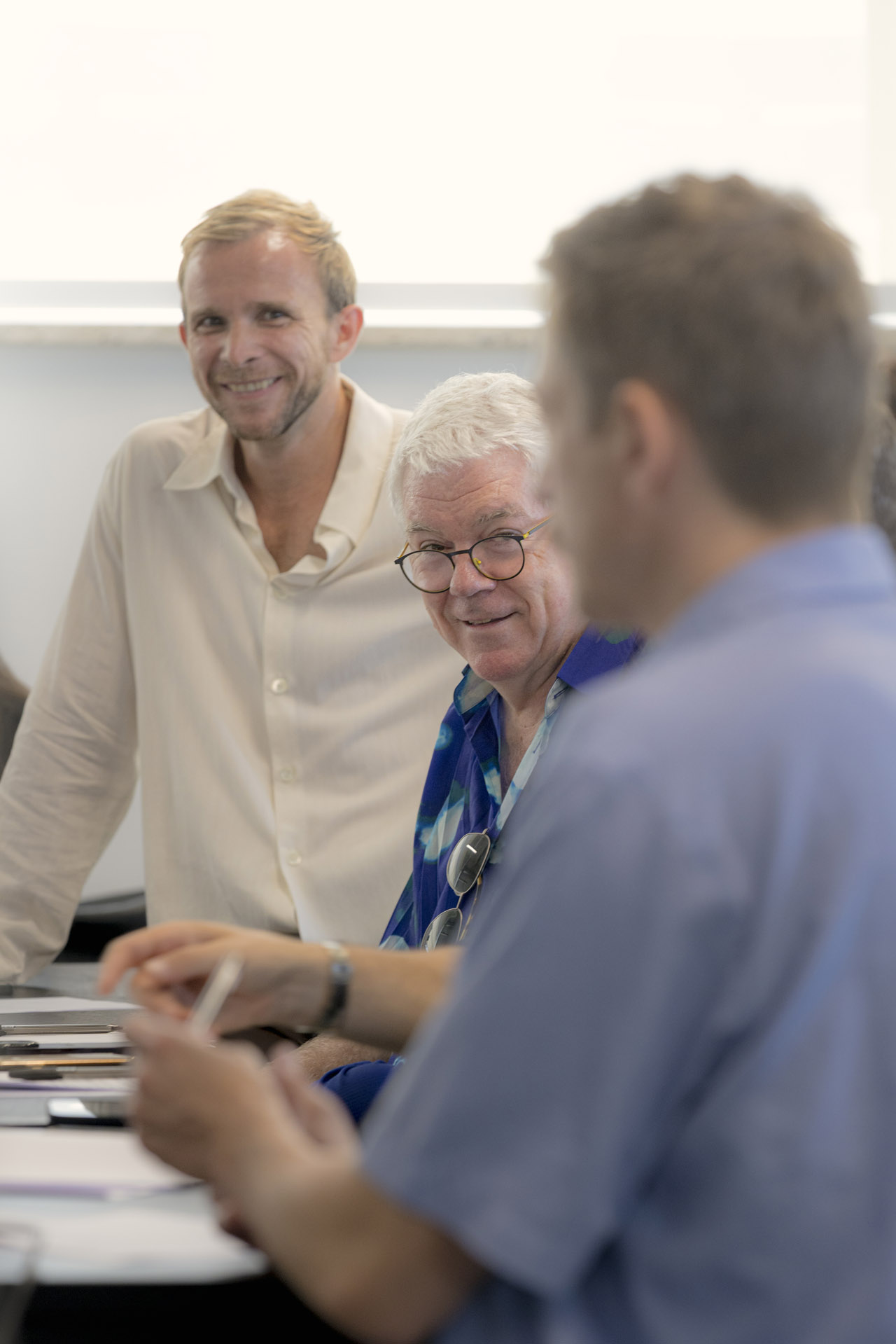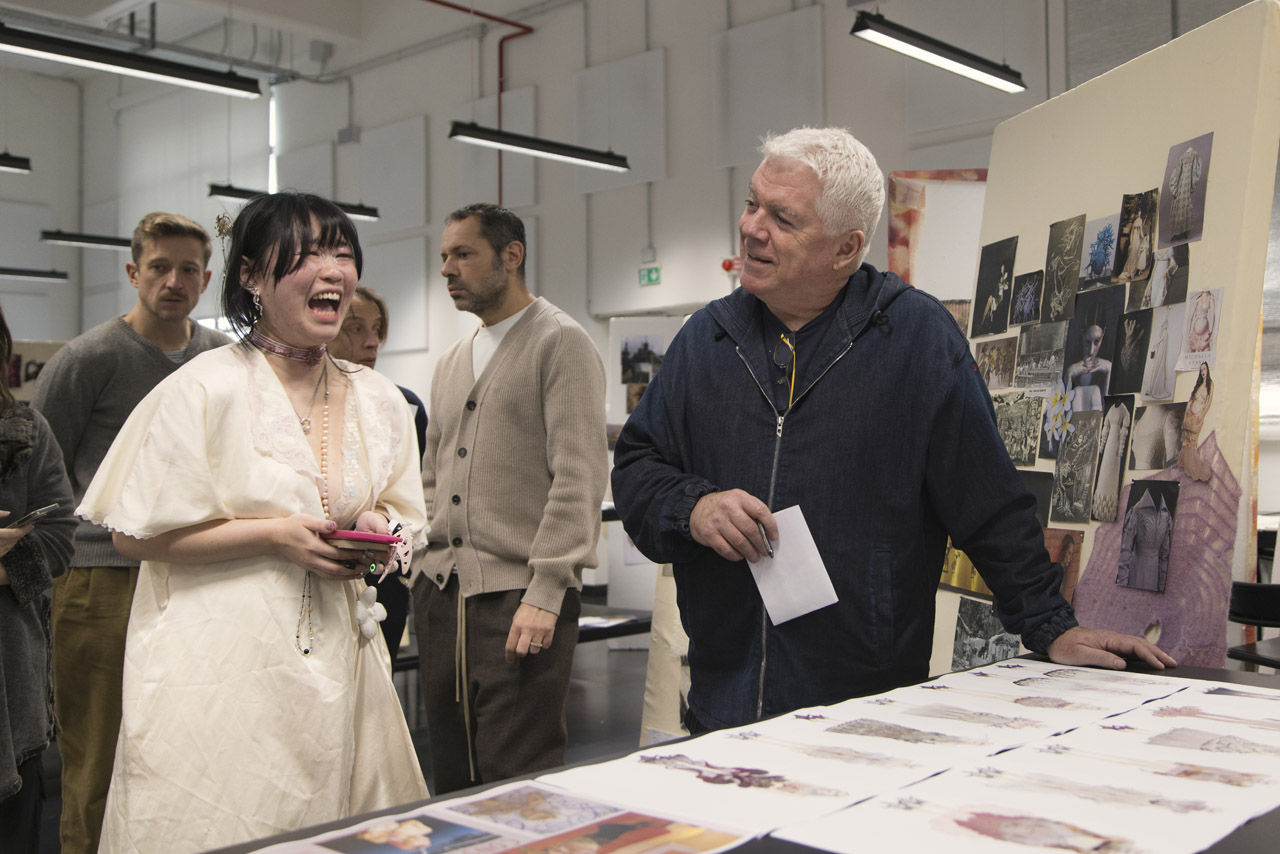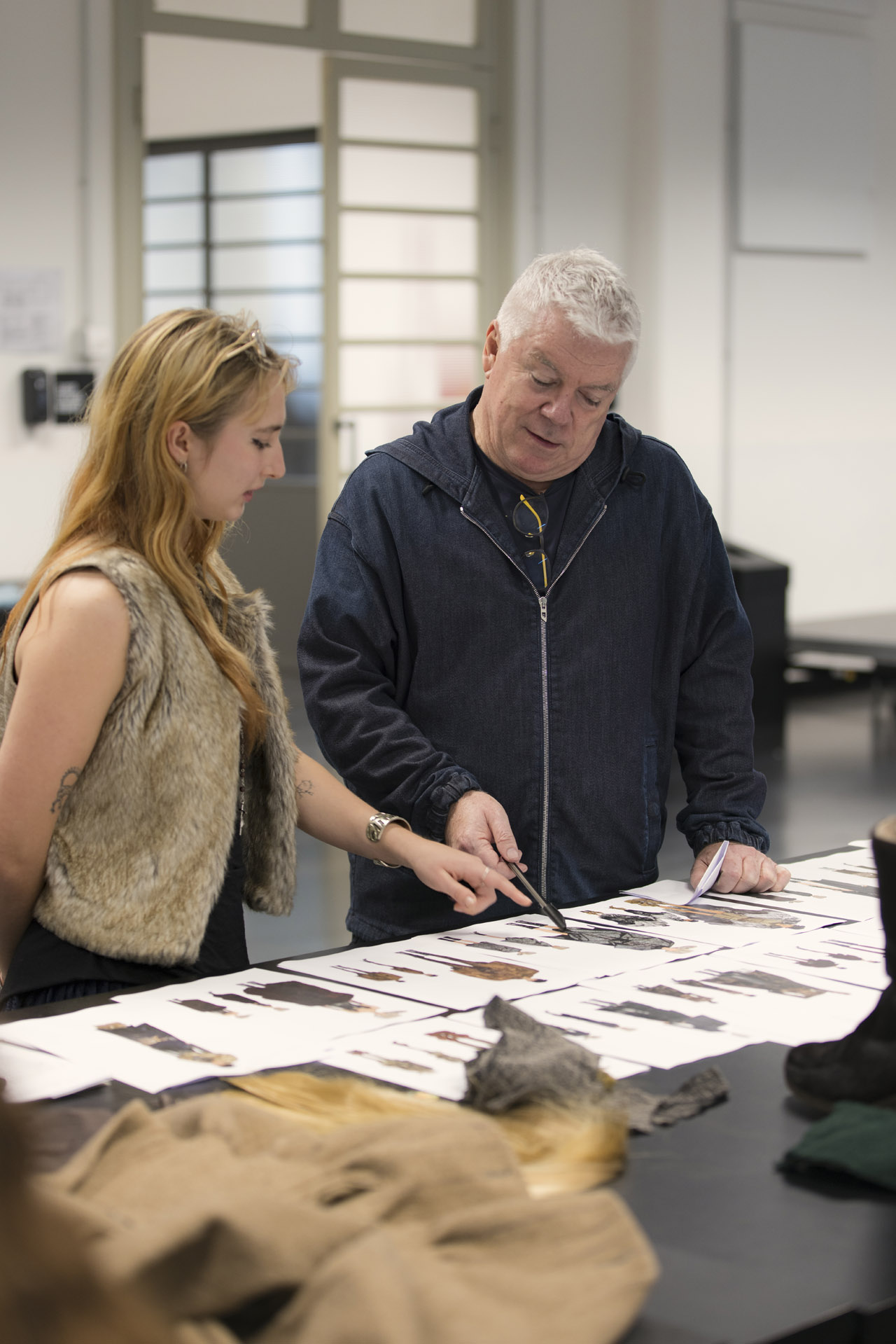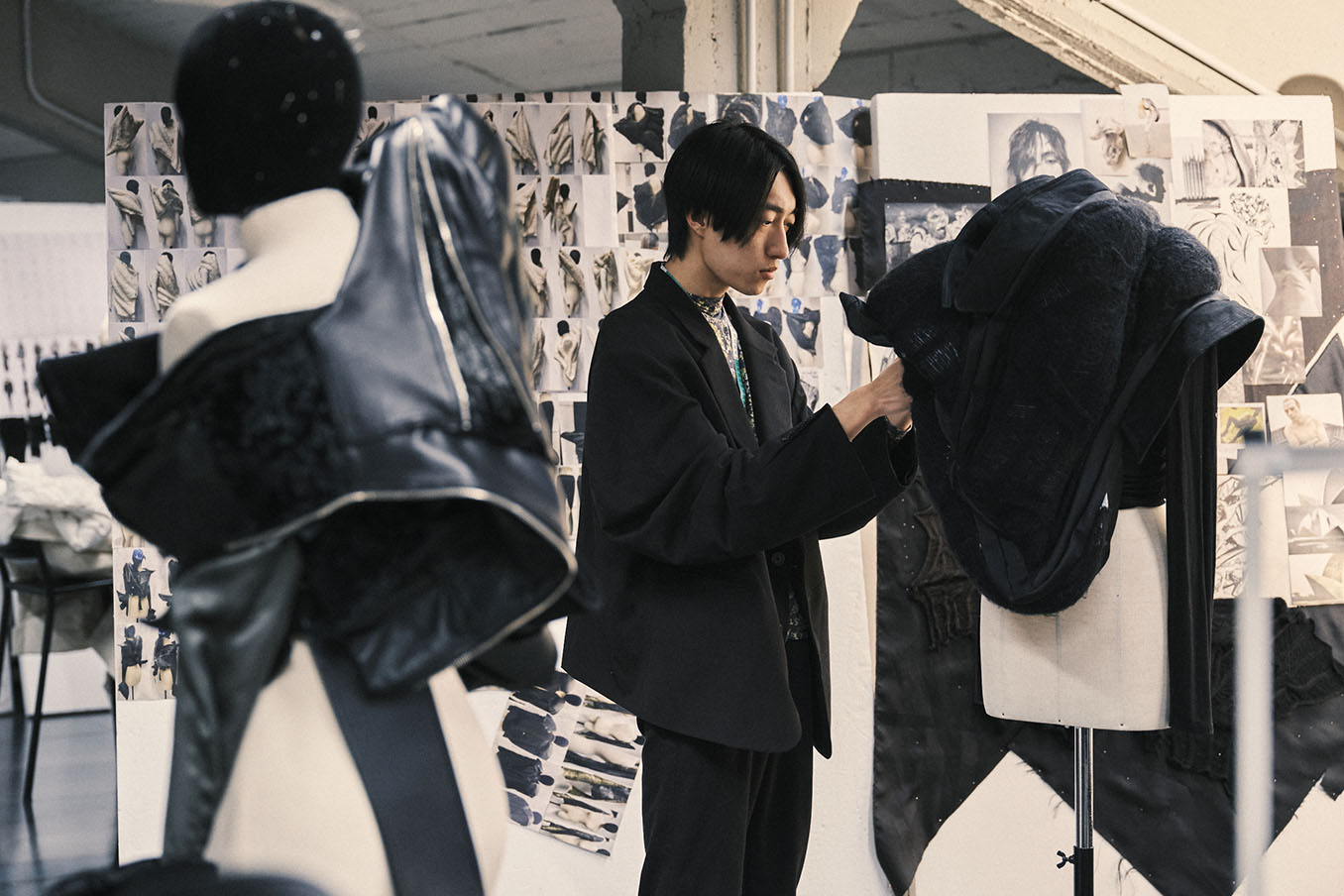Love looks not with the eyes, but with the mind, and Tim Blanks, self-described “fashion outsider,” is in deep. The fashion journalist of all fashion journalists, he’s not afraid to criticize the one great love of his life.
Honest, sapient, and discerning, the Editor-at-Large of The Business of Fashion brings this same unflinching perspective to his role as Mentor of the final year of Undergraduate in Fashion Design at Polimoda. In this interview, the writer and broadcaster tackles the future of fashion journalism and the problem with fashion education, as well as delivering a no-holds-barred statement on an industry that is too money-focused, and dominated by “dinosaurs.” When mentoring Polimoda’s final year fashion design students, he emphasizes storytelling, coherence, and the ability to recognize when someone has that special spark, while putting aside personal taste. With just a week to go until this year’s graduate show, and moments after his review of the final student collections, editor of Polimoda’s Journal, Phoebe Owston, sat down with Blanks to get his unfiltered thoughts on fashion’s future and the students ready to shape it.

What drew you to being involved in fashion education, and what do you think motivates students and young people to study and work in fashion?
A few years ago, Massimiliano Giornetti called me to lead a course in Fashion Writing and Curation and I thought it sounded interesting. It was a very nebulous subject in the end, and it would have required a lot more from everybody to make it last as a course.
That said, I think of myself as a fashion outsider. I succeeded in what I do because I said yes to absolutely everything everybody asked me to do. I would always say you’ll be much better off by doing rather than studying. Experience is going to be a hell of a lot more valuable than anything that somebody like me can tell you. The ones who go and work in the industry, were always going to work in the industry, they would have done that with or without fashion education because they’re just good, they’re creative, they’re original, they’re problem solvers, problem generators, and sponges.
If Christopher Kane, who is one of the greatest designers of the last 20 years, couldn’t make a fashion business work with everything he had on his side, it means you must love what you do. Same with any other aspect, if you’re writing, if you’re designing, if you’re taking photographs, if you’re doing illustration, whatever, you do it because you love it.

You are a fashion critic. What does that mean?
I have always challenged the idea of criticism as “those who can, do, and those who can’t, criticize”. I prefer to think of myself as a companion, like somebody to walk through fashion with. When I write about shows, for the last 20 years, my philosophy has always been about taking people there who weren’t there, that’s what I’ve wanted to do.
I suppose the point to criticism is establishing standards. It’s creating degrees of attainment or something. My problem with it is, what right do I have to shit on something that somebody spent six months thinking about and making? Whether it’s a movie, a record or a book they’ve written, somebody did something that I don’t or can’t do, and who am I to tell them it’s not good?
I wrote a piece on Maria Grazia Chiuri last night and I only wrote a little bit about the show, because it was actually about her entire career. It’s not a Marmite proposition, it’s not love it or hate it, it’s extremely beautiful, but it’s also dull and repetitive. There were more interesting things to say about her last night than writing solely about the show. There was a lot to say about her extracurricular activities, which I’m assuming she will continue to do, now she’s left Dior. That’s what I do, I find what interests me and write about that, and hope that it interests other people. It’s not pitched as criticism, it’s pitched as a human-interest story.

Is that what drives you? Why do you do what you do?
I love it. I love writing. I’m very lazy, and I’m grateful that I have a job, which makes me write regularly. I can easily write a book for a publisher on a commission, but I can’t do that for myself. It really irritates me.
If I have a job to do, I’ll do it. I love writing, I love making order out of chaos with words. I love fashion, but I also love music and movies. I like music more than fashion. I love television, I love magazines. What I love about fashion is it’s one thing that brings all those things together. In opera, you don’t get rock music and a miniskirt, necessarily, but in fashion, you get the rock music, the miniskirt, and opera. You just get everything. It’s the biggest umbrella to work under.
What do you think about the younger generations of fashion critics and journalists?
Everyone’s a critic now on social media. There are all these kids who’ve made a name for themselves with it. Some of them are super scathing and mean about things, because mean gets clicks. I think it’s all fine. I embrace life’s rich tapestry. I wish there were more fashion writers I like reading. I don’t read fashion writers very much; my favorite magazine is The Atlantic. I read more current affairs politically things now and I never, ever buy fashion magazines. My favorite fashion magazine is System, and I don’t even really think of it as a fashion magazine.
It’s not that I wish there was better, I wish there was both more and a little less. I wish there were people who wrote about fashion the way the people who write about music or sport write. I realize that fashion is very different. Fashion is more compromised because you won’t get invited to things, you won’t get gifted things. I think maybe fashion makes you quite materialistic and protective of your patch.

What would be your biggest criticism of the industry as a whole right now?
It’s too caught up in money, and it’s lost. All those big companies, what fashion was, the ’90s as the golden age was because of the independent designers and retailers who are all gone now. Now it’s all LVMH; they are like dinosaurs stumbling around and they’re not going to be around forever. My big thing is designers and independent retailers. The industry’s greed has crushed that one joyful little corner, which actually was where opportunity came from for people. That doesn’t exist anymore.
In terms of the big maisons, who is doing something different from a design perspective?
Rick Owens, Dries van Noten, Issey Miyake, Jun Takahashi. Japanese fashion is what fashion used to be. Lots and lots of little guys who have one shop, and that don’t do wholesale or only do wholesale a tiny bit. And then there’s Dover Street Market, that gives them an opportunity to take it around the world.
You judge lots of fashion awards like ANDAM and the International Woolmark prize, what do you look for when you judge? What’s your approach to judging?
You know it when you see it. Duran Lantink won Woolmark last year, and it was just so easy to see, it was a no-brainer. It challenged, provoked, it was beautifully realized, even if it wasn’t something that you necessarily related to yourself, it was just so coherent. The first time you saw Jean-Paul Gaultier at the end of the 1980s, you were like, “wow,” that excitement is what I’m looking for.

As a mentor for the final year in Undergraduate Fashion Design at Polimoda, what do you?
I look at the narrative of the collections. It’s such a cliche, but I love storytelling. I love wit. I love people who can incorporate a feeling of joy. I don’t mind horror and darkness, and Gothicism either. You have to take your own taste out of things. I like Nicolas de Felice at Courrèges. He’s not really my style of clothing, I just think he’s brilliant at what he does. I get a real buzz when I’m like, “wow, I couldn’t do that.”

What do you think of the work by this year’s graduating class of Fashion Design at Polimoda?
Some of them are really good. Some of them have an idea in their head, they can put it on a page so it looks fabulous, and then they can make it. Even if I don’t like it, even if it’s not my taste, I can see it’s good.
There’s something else interesting. There’s a couple that even if they don’t go into fashion, you know that whatever they do, they’ll be amazing at it, you can tell. On the other hand, some students get stuck to an idea that isn’t going to get them anywhere, and they won’t open up the idea so it presents other possibilities to them, they’re just stuck with this idea that is a dead end.
I’m sure it happens anywhere. When I was at university, I was lazy, I was very unmotivated, and I was too busy being a glam rocker and zooming around with no eyebrows and dyed red hair. I’m from Auckland, and there were about five people on campus. We had our little David Bowie thing going on. Everyone else was hippies. We had our crazy clothes and our makeup and so on. I was the top student in my year. My tutor called me in, and he said, “I’m really glad I have the top student, but I’m really sorry it was you because you didn’t do anything.”
He said, “I have students who busted their guts and fail.” I do feel higher education is a bit of a game, and you can play it. If you play it well, you’ll do fine. I loved what I did, and I did what I love, which I think was good, too. I studied things I love. I wouldn’t say it was easy, but I did what I needed to do to do well because I loved it, and it wasn’t like work, which is actually a good lesson in life. I think a lot of people think something must be hard for it to be good.
Polimoda’s Graduate Show 2025 takes place on 16 June at 5pm at Stazione Leopolda, Florence, Italy.

